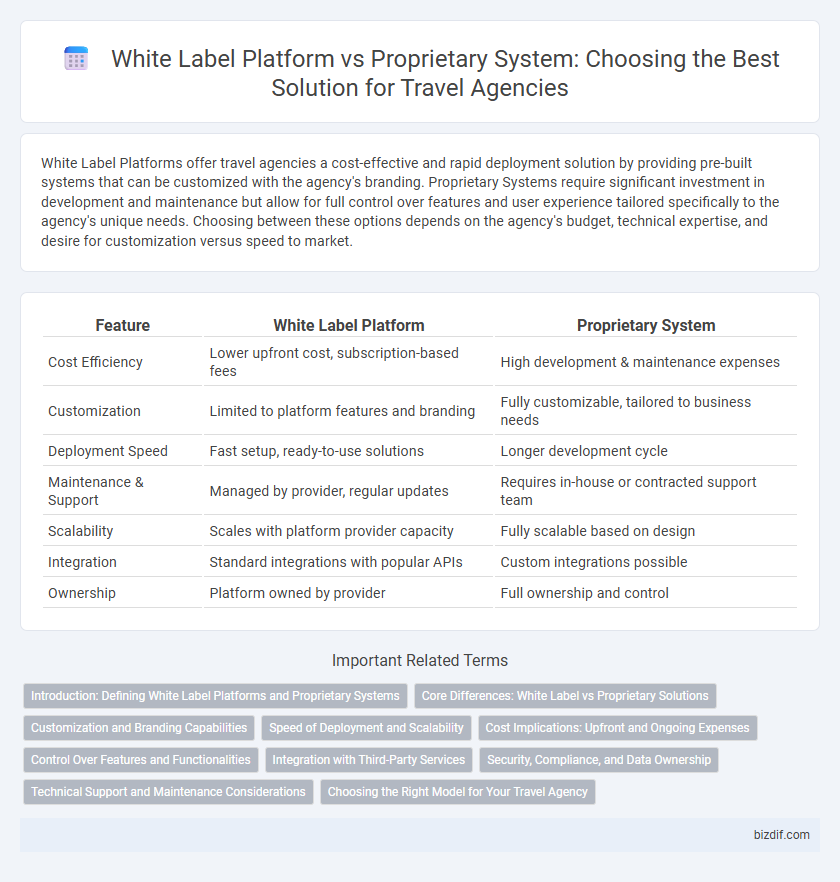White Label Platforms offer travel agencies a cost-effective and rapid deployment solution by providing pre-built systems that can be customized with the agency's branding. Proprietary Systems require significant investment in development and maintenance but allow for full control over features and user experience tailored specifically to the agency's unique needs. Choosing between these options depends on the agency's budget, technical expertise, and desire for customization versus speed to market.
Table of Comparison
| Feature | White Label Platform | Proprietary System |
|---|---|---|
| Cost Efficiency | Lower upfront cost, subscription-based fees | High development & maintenance expenses |
| Customization | Limited to platform features and branding | Fully customizable, tailored to business needs |
| Deployment Speed | Fast setup, ready-to-use solutions | Longer development cycle |
| Maintenance & Support | Managed by provider, regular updates | Requires in-house or contracted support team |
| Scalability | Scales with platform provider capacity | Fully scalable based on design |
| Integration | Standard integrations with popular APIs | Custom integrations possible |
| Ownership | Platform owned by provider | Full ownership and control |
Introduction: Defining White Label Platforms and Proprietary Systems
White Label Platforms are pre-built travel technology solutions that agencies can brand as their own, enabling quick market entry without extensive development. Proprietary Systems are custom-built platforms developed in-house, offering full control over features, user experience, and data management. Choosing between these options involves balancing speed, customization, and long-term scalability for travel businesses.
Core Differences: White Label vs Proprietary Solutions
White label platforms offer travel agencies ready-made, customizable booking systems that reduce development time and costs, enabling faster market entry with established technology. Proprietary systems are developed in-house, providing full control over features, user experience, and data security but require significant investment in development and maintenance. The core difference lies in flexibility and ownership: white label solutions prioritize scalability and quick deployment, while proprietary systems emphasize tailored functionality and competitive differentiation.
Customization and Branding Capabilities
White label platforms offer extensive customization and branding capabilities, enabling travel agencies to tailor user interfaces and functionalities to match their unique brand identity without extensive development costs. Proprietary systems provide deeper control and bespoke feature development but often require significant investment in time and technical resources to achieve full customization. Choosing between the two depends on a travel agency's priorities for scalability, brand differentiation, and resource allocation.
Speed of Deployment and Scalability
White Label Platforms enable travel agencies to rapidly launch their services by leveraging pre-built, customizable solutions, significantly reducing time-to-market compared to proprietary systems that require extensive development. Scalability is inherently designed into White Label Platforms, allowing seamless expansion as customer demand grows, whereas proprietary systems often face scaling challenges due to limited resources and custom infrastructure. Prioritizing speed and growth, White Label Platforms offer optimized cloud-based architectures that support quick integration of new features and market adaptability.
Cost Implications: Upfront and Ongoing Expenses
White Label Platforms offer lower upfront costs by providing ready-made travel solutions, reducing initial development expenses for agencies. Proprietary Systems require significant investment in customization and software development, leading to higher initial financial commitment. Ongoing expenses for White Label Platforms typically include subscription or licensing fees, while Proprietary Systems often incur maintenance, updates, and dedicated IT support costs.
Control Over Features and Functionalities
White label platforms offer limited customization and control over features, as they rely on pre-built templates and functionalities managed by third-party providers. Proprietary systems grant travel agencies full control to tailor features and functionalities according to specific business needs, enabling unique user experiences and competitive advantages. Investing in a proprietary system ensures greater flexibility in updating and expanding platform capabilities without external constraints.
Integration with Third-Party Services
White Label Platforms offer seamless integration with multiple third-party services through pre-built APIs, enabling travel agencies to expand their offerings efficiently. Proprietary Systems require custom development efforts to connect with external suppliers, often resulting in longer deployment times and higher costs. Choosing a White Label Platform enhances operational flexibility by providing instant access to diverse inventory, including airlines, hotels, and car rentals.
Security, Compliance, and Data Ownership
White Label Platforms offer robust security protocols managed by specialized vendors, ensuring compliance with industry standards such as GDPR and PCI DSS, while data ownership typically resides with the platform provider, limiting direct access for travel agencies. Proprietary Systems grant travel agencies full control over data ownership and security measures, facilitating tailored compliance strategies and enhanced protection of sensitive customer information. Choosing between these options depends on the agency's capacity to manage security infrastructure versus reliance on third-party compliance assurances.
Technical Support and Maintenance Considerations
White Label Platforms offer dedicated technical support and regular maintenance managed by the provider, reducing the in-house IT burden for travel agencies. Proprietary Systems require significant internal resources for ongoing troubleshooting, updates, and system optimization to ensure seamless operation. Evaluating the technical support responsiveness and maintenance frequency is crucial for maintaining platform reliability and minimizing downtime.
Choosing the Right Model for Your Travel Agency
White label platforms offer travel agencies rapid deployment and cost-effective customization, enabling branding without the need for extensive technical development. Proprietary systems provide full control and unique functionalities tailored to specific business processes but require significant investment in development and maintenance. Selecting the right model depends on your agency's budget, technical expertise, and desire for customization versus time-to-market efficiency.
White Label Platform vs Proprietary System Infographic

 bizdif.com
bizdif.com